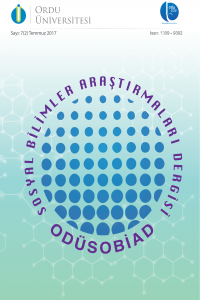Abstract
Personality construct in Marxist discourse, showing a critical approach to social structure, is a criterion that allows for the identification of the ideological content of the text and the evaluation of the ideology in terms of language usage. The ideology that shapes the construct of the literary text redefines the deep structure by assigning new meanings to corpus, composed of linguistic signs. The formative effect of ideology on discourse and society can be presented in texts, with different constructs. Especially the construct of personality offers important clues about society, economic and political life, with its function determining an individual's status within society. Personality gains a new speculative dimension in discourse, a product of ideological thinking. The construct of personality presents a sample of the social structure and allows us to see the influence of ideology on society in a large scale starting from the individual.
This study involves the evaluation of the construct of personality in Kağnı, Kamyon, Kafakâğıdı, Candarma Bekir, Kazlar and Bir Firar stories, written by Sabahattin Ali, in terms of discourse. The analysis of the discourse, forming the literary text, by linguistic methods allows the observation of the ideological dimension contained in the text. The aim of this study, which involves the identification and evaluation of how social structure and personality formation are critically constructed in terms of Marxist discourse, is to analyze the discourse shaped by ideology, and social structure shaped by ideological discourse. The identification of how Marxist ideology is defined as a discourse in a language also presents the information regarding how creating ideas and common discourse play a role in designing society.
Keywords
Sabahattin Ali’s Stories Marxist Discourse Analysis of Discourse Linguistic Analysis Personality Construct
References
- Ali, S. (2013a). Değirmen. İstanbul: Yapı Kredi.
- Ali, S. (2013b). Kağnı, Ses, Esirler. İstanbul: Yapı Kredi.
- Aşkaroğlu, V. (2015). Postmodernizm Sınırsız Özgürlük mü? Özgürlüğün Sınırı mı?. Ankara: Karadeniz Dergi.
- Aşkaroğlu, V. (2016). Romanlarda Kişilik Kurgusu: Kuramsal Bir Karşılaştırma. ODÜ Sosyal Bilimler Araştırmaları Dergisi, 6 (14), 301-319. ODÜ Sosyal Bilimler Araştırmaları Dergisi url’si. http://sobiad.odu.edu.tr
- Büyükkantarcıoğlu, N. (2006). Söylemden İdeolojiye: Eleştirel Söylem Çözümlemesi. Ahmet Kocaman (Haz.). Dilbilim Temel Kavramlar Sorunlar Tartışmalar içinde (ss. 101-117). Ankara: Dil Derneği.
- Eagleton, T. (2011). İdeoloji. Muttalip Özcan (Çev.). İstanbul: Ayrıntı.
- Eagleton, T. (2012). Eleştiri ve İdeoloji (Marksist Edebiyat Teorisi Üzerine Bir Çalışma). Savaş Kılıç (Çev.). İstanbul: İletişim.
Abstract
Toplumsal yapıya eleştirel olarak yaklaşan
Marksist söylemde kişilik kurgusu, metnin ideolojik içeriğinin tespitine ve
ideolojinin dil kullanımları boyutunda değerlendirilmesine olanak sunan bir
ölçüttür. Edebî metnin kurgusunu şekillendiren
ideoloji, derin yapıyı dilsel göstergelerden oluşan bütünceye yeni anlamlar
yükleyerek yeniden kurgular. İdeolojinin söylem ve toplum üzerindeki
biçimlendirici etkisi, metinlerde farklı kurgularla sunulabilir. Özellikle
kişilik kurgusu, bireyin toplum içindeki konumunu belirleyen işleviyle toplum, ekonomik ve politik yaşam hakkında önemli ipuçları sunar. Kişilik, ideolojik
düşüncenin bir ürünü olan söylem içinde yeni kurgusal bir boyut kazanır.
Kişiliğin kurgusu, toplumsal yapının bir örneklemini sunar ve bireyden hareketle
ideolojinin toplum üzerindeki etkisini büyük ölçekli olarak görmemizi sağlar.
Bu çalışma,
Sabahattin Ali’nin; Kağnı, Kamyon,
Kafakâğıdı, Candarma Bekir, Kazlar ve
Bir Firar adlı öykülerindeki kişilik kurgusunun Marksist söylem açısından
değerlendirilmesini içerir. Edebî metni oluşturan söylemin dilbilimsel
yöntemlerle çözümlenmesi metnin içerdiği ideolojik boyutun gözlemlenmesine
olanak sunar. Toplumsal yapının ve kişilik oluşumunun Marksist söylemin tespit
ve değerlendirmesini içeren bu çalışmanın amacı, ideoloji ile şekillenen
söylemin ve ideolojik söylem ile şekillenen toplum yapısının kurgusal düzlemde
nasıl karşılık bulduğunun çözümlenmesidir. Marksist İdeolojinin dilde nasıl
karşılık bulduğunun tespiti, düşüncenin üretiminin ve ortak söylemin toplumu
biçimlendirmede nasıl bir rol oynadığının bilgisini de sunar.
Keywords
Sabahattin Ali Öyküleri Marksist Söylem Söylem Çözümlemesi Dilbilimsel Çözümleme Kişilik Kurgusu
References
- Ali, S. (2013a). Değirmen. İstanbul: Yapı Kredi.
- Ali, S. (2013b). Kağnı, Ses, Esirler. İstanbul: Yapı Kredi.
- Aşkaroğlu, V. (2015). Postmodernizm Sınırsız Özgürlük mü? Özgürlüğün Sınırı mı?. Ankara: Karadeniz Dergi.
- Aşkaroğlu, V. (2016). Romanlarda Kişilik Kurgusu: Kuramsal Bir Karşılaştırma. ODÜ Sosyal Bilimler Araştırmaları Dergisi, 6 (14), 301-319. ODÜ Sosyal Bilimler Araştırmaları Dergisi url’si. http://sobiad.odu.edu.tr
- Büyükkantarcıoğlu, N. (2006). Söylemden İdeolojiye: Eleştirel Söylem Çözümlemesi. Ahmet Kocaman (Haz.). Dilbilim Temel Kavramlar Sorunlar Tartışmalar içinde (ss. 101-117). Ankara: Dil Derneği.
- Eagleton, T. (2011). İdeoloji. Muttalip Özcan (Çev.). İstanbul: Ayrıntı.
- Eagleton, T. (2012). Eleştiri ve İdeoloji (Marksist Edebiyat Teorisi Üzerine Bir Çalışma). Savaş Kılıç (Çev.). İstanbul: İletişim.
Details
| Subjects | Creative Arts and Writing |
|---|---|
| Journal Section | ARTICLE |
| Authors | |
| Publication Date | July 7, 2017 |
| Submission Date | July 7, 2017 |
| Published in Issue | Year 2017 Volume: 7 Issue: 2 |

